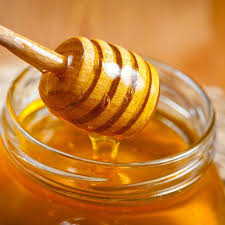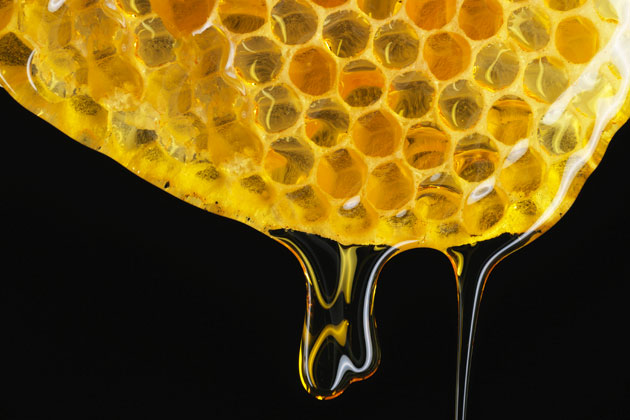 Mary Poppins sings, "Just a spoonful of sugar helps the medicine go down" yet a spoonful of honey can be as powerful as medicine and it goes down so much easier. That's why it's been taken as a health supplement and cure since the Stone Age. For over 2000 years cultures have documented it's uses and now western science is adding to that medical literature. Its sweet taste beats most medicines and its power to heal a broad range of conditions is impressive. Is it time to bring more honey into your life?
Mary Poppins sings, "Just a spoonful of sugar helps the medicine go down" yet a spoonful of honey can be as powerful as medicine and it goes down so much easier. That's why it's been taken as a health supplement and cure since the Stone Age. For over 2000 years cultures have documented it's uses and now western science is adding to that medical literature. Its sweet taste beats most medicines and its power to heal a broad range of conditions is impressive. Is it time to bring more honey into your life?
Honey, a plentiful product, is effective in treating many conditions that trouble us in later years. Among other things it treats: wounds, inflammation, over 60 different kinds of bacterial infections, fungal infections, herpes and gastrointestinal distress. Some hospitals in Britain have used it to combat the powerful bacterial infection, MRSA. Are you troubled with peptic ulcers? Honey kills Heliobactor pylori the bacteria that causes them. Suffering a bout of diarrhea? Concentrated honey could shorten your discomfort. Bothered with insomnia? Have you tried a cup of warm milk and honey before you go to bed? Medical grade honey has recently been flagged as a potential aid for many challenging conditions: cancer, cardiovascular disease and, perhaps, aspects of neurological conditions. Though honey should not be given to children less than one year old some pediatricians are suggesting children older than one who accidentally ingest button batteries can minimize the damage by taking honey at "regular intervals" before they reach the hospital. That's a long list of medical benefits from a sweetener so many of us think of only as a substitute for sugar.
Honey is unique as a healing agent. Unlike traditional antibiotics honey doesn't cause antibiotic resistance so it can be used long term without concern that it may lose effectiveness. That property is what spurred recent interest in American medical research. What researchers found is that honey heals in part through the generation of hydrogen peroxide which conquers many strains of bacteria. Honey has several other interesting and promising properties which are described in medical terms at The National Institutes of Health for those of you who are curious. The common golden syrup in our cupboards is surprisingly complex.
 The honey bear you find in stores is not complex but it's cute and what it holds is a highly pasteurized sweetener that has unfortunately lost much of it's healing power. Enjoy a spoonful or two of local honey each day for antibacterial, antioxidant and anti inflammatory support. Darker honey generally contains greater medicinal power. Some healers suggest raw honey but be aware that it may contain Clostridium Botulium. That's why children under one year old should not be given honey. Their digestion is unequipped to deal with botulism spores. A special honey made from the manuka flower of New Zealand has plus antibacterial properties and is available over the counter in a topical, cream, or adhesive for treating wounds and specific conditions. Honey is a sugar that's high in carbohydrates so is not appropriate for all diets. If you take it daily as a preventative please practice moderation.
The honey bear you find in stores is not complex but it's cute and what it holds is a highly pasteurized sweetener that has unfortunately lost much of it's healing power. Enjoy a spoonful or two of local honey each day for antibacterial, antioxidant and anti inflammatory support. Darker honey generally contains greater medicinal power. Some healers suggest raw honey but be aware that it may contain Clostridium Botulium. That's why children under one year old should not be given honey. Their digestion is unequipped to deal with botulism spores. A special honey made from the manuka flower of New Zealand has plus antibacterial properties and is available over the counter in a topical, cream, or adhesive for treating wounds and specific conditions. Honey is a sugar that's high in carbohydrates so is not appropriate for all diets. If you take it daily as a preventative please practice moderation.
Honey is sweet news but a blog about its benefits must also alert readers that honey bees need our help to continue producing medicinal support. Colony Collapse Disorder is a real danger to these pollinators and it's not the only threat. Farming pesticides, disappearance of bee foraging areas, and stress affiliated with cultivation logistics all contribute to die offs in bee populations. Nature and its resources are in a balance man must respect in order to thrive and enjoy wellness. You can help by thinking of bees when you plant and care for your own yard and garden.
If you're still thinking about honey as a sweetener for tea or baked goods you're in for a surprise as you explore it's healing qualities. Bring its full power into your daily life by taking it as a broad spectrum preventative or aid for specific conditions. Use it to ease inflammation or put it to work against serious health challenges. Honey, a curative as old as the Stone Age, is up to the task of addressing our modern health problems. Won't you bring it's sweetness into your day?

